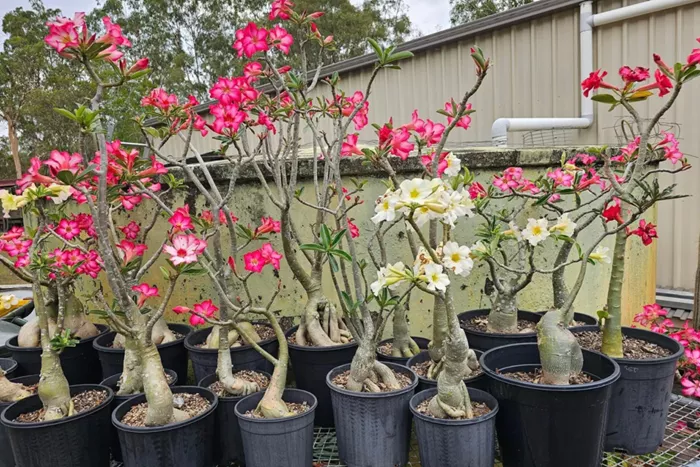The desert rose, known for its swollen stem and vibrant flowers, is a popular plant among Australian gardeners. However, experts are warning that behind its stunning appearance lies a toxic reality.
Adenium obesum, the most common type of desert rose, is native to regions such as the Arabian Peninsula and Africa. Despite this, it is widely sold and planted in Australia, according to Dermot Molloy, a horticulturist with the Royal Botanic Gardens Victoria.
While admired for its beauty, the desert rose is part of the Apocynaceae family, which means it contains a poisonous sap. This sap can be dangerous if ingested or if it comes into contact with the eyes. “Please use gloves and eye protection if pruning,” Molloy advised.
The toxicity of the plant became widely known after a Queensland nursery shared a warning on Facebook last week. Bundaberg Landcare posted that the plant’s sap is toxic, urging caution but avoiding unnecessary alarm. Local reactions revealed widespread surprise, with many saying they did not know about the plant’s potential dangers.
One commenter noted, “Interesting. I did not know that. Lots of plants are poisonous.” Another added, “They’re very pretty and so unusual. I’ve loved them for years.”
Another variety of desert rose, adenium multiflorum, is also highly toxic. When a branch is broken, the plant releases a milky latex that is dangerous to humans and animals. According to Damian Wrigley, manager of living collections at the Botanic Gardens of Sydney, the toxicity comes from cardiac glycosides, which are toxic alkaloids found in all parts of the plant.
Ingesting the sap can lead to symptoms such as stomach upset, low blood pressure, dizziness, lethargy, and a slow heart rate. For this reason, it’s crucial to keep desert rose plants away from children and pets.
Since the desert rose is an introduced species, experts advise keeping it in containers or well-contained gardens to prevent it from becoming a pest in the wider environment. “The species is known to do well when kept as a bonsai,” Wrigley added.
The warning comes as Australian authorities urge responsible gardening practices to avoid unintended ecological consequences.
Related topics:
- Gardener Reveals the Perfect Flower to Plant for a Vibrant Red and Pink Display
- Indigenous Plants: Essential for a Stable and Thriving Environment
- Steve Erdman: Why Plants Depend on Carbon Dioxide to Thrive


